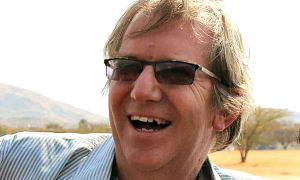Obituary Jeremy Silvester
Whether in the solidarity movement in London in the 1980s, as an academic at the University of Namibia in the 1990s, or as director of the Museums Association of Namibia thereafter, my friend Jeremy Silvester, who has died of Covid-19 aged 58, was a builder. He built communities, he built projects, he built up the young, and he built movements and momentum, often out of nothing.
Born in Exmouth, Devon, to Donald Silvester, a civil engineer, and Eleanor (nee Richards), Jeremy attended Blundell’s school in Tiverton and studied history at Cardiff University, then took a master’s in southern African studies at York University and a PhD in African history at the School of Oriental and African Studies.
While a student in 1980s London, living in Brixton, he combined research on the marginalised history of southern Namibia with an ardent activism, gaining direct experience of police brutality during protests against Thatcher’s poll tax. This pattern of joint academic and activist work continued. Jeremy and I met initially through Namibia Support Committee activities and social gatherings.
 From 1994 he taught at the University of the West of England, then at Bristol University, before moving in 1997 to take up a post as history lecturer at the University of Namibia. In the 1990s Jeremy gave the Trees Never Meet collaborative research project its name, from a proverb that signifies people will always connect – he and I both worked on the project, which brought together new PhD studies from a dozen young scholars. Many other collaborations followed: on photographic archives, public history, museums, and Namibia’s history of resistance. In a fractured country that suffered two periods of colonialism and a genocide, Jeremy believed that archives, photographs and cultural objects could activate people into connecting with their history and open up routes to justice.
From 1994 he taught at the University of the West of England, then at Bristol University, before moving in 1997 to take up a post as history lecturer at the University of Namibia. In the 1990s Jeremy gave the Trees Never Meet collaborative research project its name, from a proverb that signifies people will always connect – he and I both worked on the project, which brought together new PhD studies from a dozen young scholars. Many other collaborations followed: on photographic archives, public history, museums, and Namibia’s history of resistance. In a fractured country that suffered two periods of colonialism and a genocide, Jeremy believed that archives, photographs and cultural objects could activate people into connecting with their history and open up routes to justice.
He engaged the public outside churches, in shopping malls and in newspaper columns to trigger community responses that began dialogue, and resulted in articles, exhibitions and ultimately new community museums across Namibia. He mobilised many students to do the same work, greatly increasing public debate and participation in political life.
Under his leadership from 2005, the Museums Association of Namibia team intervened in international debates on cultural restitution, and began to redefine the African museum. For decades Jeremy combed the former colonial world and mapped the scattered traces of Namibia’s history. His aim was to return them to the country he loved.
Jeremy believed that love could overcome the hatred in the world. He always saw the positive, never the negative, and it was underpinned by a wry sense of humour. When opportunity allowed (not often, owing to his enormous workload), he enjoyed hiking, and a memorable destination was the Fish River Canyon. He loved his world travels.
He is survived by his partner, Justina Ashipala, and their daughters, Afrika and Asia, by his daughter Shelley, from an earlier relationship, with Cornelia Shiimi, and by his sister, Rose.
Other obituaries for Jeremy can be read on the ICME site.